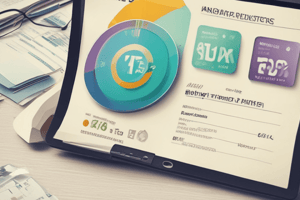Podcast
Questions and Answers
What is the scale for minimum to maximum possible credit score?
What is the scale for minimum to maximum possible credit score?
- 500 - 900
- 100 - 700
- 300 - 850 (correct)
- 250 - 800
Why do lenders look at credit reports?
Why do lenders look at credit reports?
- To provide details about your savings
- To decide if you’re a qualified or risky candidate for credit (correct)
- To determine the size of your household
- To edit your credit score
What information is NOT included in your credit report trade lines?
What information is NOT included in your credit report trade lines?
- Checking account balance (correct)
- Current loan balances
- Account opening dates
- Payment history
What percent of Americans know their credit score?
What percent of Americans know their credit score?
What is a 'Thin File' in terms of credit?
What is a 'Thin File' in terms of credit?
If you miss a payment with a 750 credit score, how will it impact you compared to a 650 score?
If you miss a payment with a 750 credit score, how will it impact you compared to a 650 score?
Where can you get a free copy of your credit report?
Where can you get a free copy of your credit report?
Why should you review your credit report regularly?
Why should you review your credit report regularly?
What is the primary way a credit score is determined?
What is the primary way a credit score is determined?
How long do negative financial records typically stay on a credit report?
How long do negative financial records typically stay on a credit report?
Why might someone who is 18 years old have a thin credit file?
Why might someone who is 18 years old have a thin credit file?
What is a potential drawback of services that offer a 'free credit score'?
What is a potential drawback of services that offer a 'free credit score'?
What does the Equal Credit Opportunity Act protect against?
What does the Equal Credit Opportunity Act protect against?
Flashcards are hidden until you start studying
Study Notes
Credit Score Range
- The minimum possible credit score is 300 and the maximum is 850.
Credit Score Importance
- A high credit score is beneficial.
- It helps you get better loan terms, such as lower interest rates.
Why Lenders Look at Credit Reports
- Lenders use credit reports to assess the risk of lending you money.
- They determine if you are a qualified or risky borrower.
Credit Report Trade Lines
- Credit reports include information about your payment history, current loan balances, and account opening dates.
- Your checking account balance is not included in your credit report.
Reviewing Credit Reports
- Regularly reviewing your credit report is important for monitoring factors that affect your credit score.
- Check for accuracy in your credit report, to make sure there are no errors.
Credit Score Awareness
- Approximately 58% of Americans are aware of their credit score.
Thin Credit File
- A thin credit file refers to a credit report with limited credit history.
Free Credit Reports
- You can obtain a free copy of your credit report from AnnualCreditReport.com.
Credit Score Impact
- A missed payment can have a greater negative impact on a higher credit score than a lower one.
Checking All Credit Bureaus
- It's crucial to review your credit report from all three credit bureaus to ensure accuracy, since each bureau may have slightly different data.
Loaning Money to Strangers
- When lending money to someone you don’t know, it's important to ask about the purpose of the loan to understand their financial situation.
Credit Report Contents
- Credit reports include information about your loan payment history.
Credit Report and Credit Score Relationship
- Credit scores are calculated based on data from your credit report.
Credit Report Record Retention
- Financial records typically remain on your credit report for 7 to 10 years.
Thin Credit File for Young Adults
- An 18-year-old may have a thin credit file because they are just starting to build their credit history.
"Free" Credit Scores
- Some services offer free credit scores, but may charge for updates or have other limitations.
Free Credit Scores Offered by Card Companies
- Credit card companies sometimes provide free credit scores to their customers as a way to build loyalty.
Equal Credit Opportunity Act
- The Equal Credit Opportunity Act prevents lenders from denying credit based on factors such as race, sex, or religion.
Reviewing All Credit Bureaus
- It's important to review your credit report from all three credit bureaus because they may contain slightly different information.
Important Credit Report Section for Lenders
- Lenders primarily focus on the credit account section of your credit report, which details your payment history and outstanding balances.
Studying That Suits You
Use AI to generate personalized quizzes and flashcards to suit your learning preferences.




